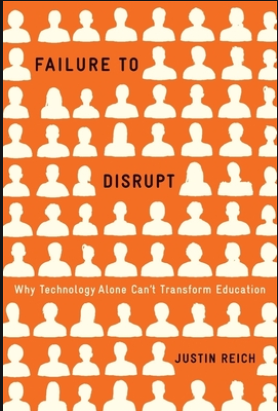 By Julie Hunt Gibbons
By Julie Hunt Gibbons
April 15th, 2021
BURLINGTON, ON
Many of the challenges of this pandemic have been solved through the use of technology. The tools of technology have allowed the world of work to continue from a safe distance. Education in Canada has been no different.
Last year’s March – June shut down in elementary, secondary, and post secondary in Ontario was facilitated by the use of online learning, both synchronous and asynchronous, through a host of different learning management systems and educational platforms and applications. This year our provincial public health challenges have varied by population and demographic and we have used technology to respond accordingly.

Failure to Disrupt: Why Technology Alone Can’t Transform Education
Here in Halton, and the surrounding GTHA, students have experienced a variety of synchronous and asynchronous fully online and hybrid learning models in response to the need for student cohorting and swells in Covid-19 numbers. The recent pandemic response, coupled with decades of technological innovation and growing use, have led many people to cite technology as the panacea for educational change in this province and around the globe. They would do well to read Justin Reich’s latest book, Failure to Disrupt: Why Technology Alone Can’t Transform Education” (2020).
Reich does not base his claims on recent pandemic events. In fact, he wrote this book prior to the onslaught of COVID-19 and points out that the supposedly transformative educational technology of the past decade has done little to revolutionize learning. He debunks claims such as:
Harvard Business School’s 2009 claim by Clay Christensen that predicted that half of all American secondary school courses would be online by 2019,
Sal Khan’s claim that Khan Academy videos would reinvent education,
Sebastian Thrun of Udacity’s claim that in 50 years we’d have only 10 institutions of higher education in the world as a result of the success of massive open online courses (MOOCs).
Sugata Mitra’s claim that students no longer need schools or teachers as groups of children with access to the internet could teach themselves anything.

Computers will be part of classrooms – but they will not replace classroom teachers.
Reich addresses MOOCs, autograders, computerized “intelligent tutors,” and widely adopted popular educational software in-depth and traces their hype, their potential,and their ultimate shortcomings. According to Reich, despite their economic success in making their creators wealthy, their benefit has been to primarily wealthy students and they have done little, if anything, to combat growing inequalities in education. Thus this has not been “true innovation” and has not radically changed the educational system in any way. Rather these tools have been adapted, tested, used or not used by educators within the system.
Technology does, and will, continue to play a crucial role in the future of education but as nothing more than a tool for classroom experimentation and the expansion of educators’ pedagogical toolkits.
None of this should come as a surprise; the pandemic has evidenced extreme growth in the use of educational technology, but the key lesson of our online learning experiments in a pandemic have been that there is a want and need for human interaction. Educators have the uniquely human skills to engage (or not engage) students. Education is at its essence a human skill and human pursuit. Change and improvement to education must come from human iterations. There is no magic technological wand.
I join Reich in his confidence that when we take stock of the education our schools provided in our schools during the pandemic, we will see evidence of many new technological classroom and teaching strategies reflective of staff learning and the practicing of technological skills. These are valuable skills and our schools can and should build on them, continuing the process of learning how to teach, learn, and use our digital tools more effectively. Educational improvement is a journey, not a destination and technology can shape and accelerate this journey but technology alone cannot transform education.

HDSB Superintendent Julie Hunt Gibbons
Julie Hunt Gibbons Halton District School Board Superintendent of Secondary Program & Student Success, North West Oakville Family of Schools was a part of the team that created the iStem courses that began at the Aldershot High school.
Julie was born in Ottawa, graduated from TA Blakelock in Oakville then attended: University of Western Ontario | B.A. Hon. | Sociology and Political Science; University of Windsor | MA. | Sociology (Socio-legal Studies) and University of Toronto |B.Ed. |Intermediate and Senior qualifications
Julie didn’t intend to be a teacher. She did a Masters in Sociology (Socio-legal studies) thinking it would be a good stepping stone to Law School. It was while working as a Teaching Assistant that she fell in love with teaching.



















Technologists tend to view education as the transfer of knowledge into young heads. Just open the lid and pour it in. This does nothing for the real purpose of education, which is to help young people grow up, learn to socialize, work with others, work out problems, develop physical skills, be mentored, learn respect, make lifelong friends, and….how long should I go on? This is not going to happen staring into a computer screen.
One of the biggest problems for many people, including students, using a computer is that they believe that the computer can do all the critical thinking for them; sadly for all of us, the weakest software in computer use is attached to the keyboard. A teacher’s critical role in the use of a computer to teach is to constantly remind students that the computer is just a tool–certainly a very valuable one, but just a tool that can’t replace their own critical analysis, thinking, and creative skills. And Perry, I certainly agree with your observations about the social interactions that are so critical to personal growth and maturity. Thinking back to my own days in school at all levels including seven years in university, the most important lessons I learned from my teachers and professors was less about subject content and more about their own personalities and expectations.
BTW, I continue to object about the Ms. Hunt-Gibbons’ resume which reads in part, “the team that CREATED the iStem courses”. This is highly inaccurate–the iStem program was developed in Australia back in 2012 and has been adopted by several countries since that time. Halton was a little late to the game although I am pleased it is now offered–it is an excellent program. Perhaps a more accurate description for these Halton educrats is “the team that adopted and adapted the iStem program”